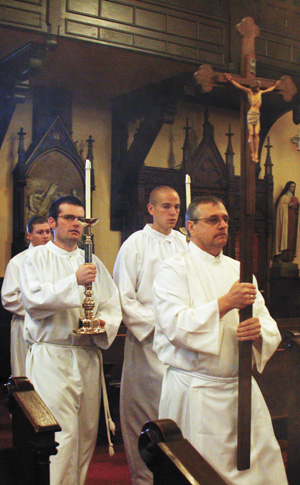By Celine Klosterman

The process of becoming a seminarian for the Diocese of Davenport begins much earlier than a man’s first phone call with the diocesan vocations director. The journey starts when seeds are planted in the home, the parish or through vocation awareness days, said Father Thom Hennen, director of vocations.
He sat down with The Catholic Messenger to share an overview of the process. Each man’s journey of discernment is different, but Bob Cloos explained the path he took toward becoming a seminarian for the diocese.
A series of events
Cloos, 54, who is beginning his third year of studies in theology, traces his journey back to an accident in 1993. Then working at a recycling center and garbage transfer station in Portland, Ore., he was thrown from a piece of equipment. Two back surgeries and four years of physical therapy followed.
“I wasn’t really close to the Church before my accident, but I returned to confession and Mass afterwards,” he said.
The sacraments proved helpful as he discerned his future. He took a job in maintenance, then switched to another, but both positions proved unsatisfying. So he reasoned that his undergraduate degree in finance might offer a foundation to earn a master’s degree in business administration. But while studying for a graduate school entrance exam, he realized an MBA wasn’t right for him, either.
One Saturday, as he approached a church to receive the sacrament of reconciliation, he noticed a sign saying confessions wouldn’t be heard that day. Irritated, he began walking back to his car only to hear: “Robert, patience.”
“I knew it was Jesus,” Cloos said. Turning toward the direction he’d heard the voice, he noticed a perpetual adoration chapel. He began praying there each Sunday for guidance.
“Priesthood came to my mind. But I thought I was too old — 47 at the time — and not good enough. But the thought kept coming back.”
In 2007 his employer filed for bankruptcy and he moved to Iowa, home to his childhood parish of Ss. Peter & Paul in Springbrook. He inquired about becoming a seminarian for the Archdiocese of Dubuque, but discovered he was over the age limit. So he looked into the Diocese of Davenport.
The application process
Fr. Hennen said the diocese will accept applicants into their 50s. Retirement age for priests is 70, and a seminarian’s studies typically take six to eight years.
More important than age are qualities including a serious commitment to practicing Catholicism, an ability to work with people and openness to formation.
Fr. Hennen tries to discern such qualities in potential seminarians early on. “I get referrals — people ask, ‘Will you talk to this person about the priesthood?’ Sure, but there should be some initiative on his end. If someone is serious, I try to get a sense of him over the phone … I might say, ‘You need to pray more about this.’”
If the man seems informed and earnest, Fr. Hennen will set up a couple of personal visits to get to know him. Then, the potential seminarian will receive a 26-page application.
The forms request information including how the man practices his faith, what sacraments he has received, potential canonical impediments, legal status, financial status, medical history and educational background. But the application also asks about the man’s hobbies, community involvement, friendships and dating history, which gives him an opportunity to show he’s well rounded, Fr. Hennen said.
An applicant also must complete psychological evaluations, undergo a physical, provide letters of recommendation and references, and write essays on what the priesthood means and why he thinks the Lord is calling him.
The Seminarian Admissions Board — which includes the vocations director, a pastor, a canon lawyer, a lay woman who is a licensed counselor, and the director of deacon formation — reviews the application materials. Members then discuss them with the applicant and make a recommendation on his acceptance. “The bishop makes the final call,” Fr. Hennen said.
Seminary life
On discovering he’d been accepted, Cloos said he was excited and a little overwhelmed. “I thought, I haven’t been in school for years. Can I handle this change of lifestyle? I was used to making money and doing what I wanted when I wanted.”
He was pleased to discover some seminaries cater to older students. After visiting Sacred Heart School of Theology in Hales Corners, Wis., which focuses on formation of men older than 30, he discussed that option with Father Marty Goetz, then vocations director. In 2009 Cloos began pre-theology studies there.
He and other seminarians who have a college degree, but need some formal education in philosophy and religious studies, take one to two years of pre-theology courses before beginning a four-year program in theology. Men with a high-school education enter a college seminary. After graduating from that college, they complete four years of theological study at a major seminary.
Classroom time, clinical pastoral education and parish internships are designed to address the four pillars of formation: human, spiritual, intellectual and pastoral. The experiences also help seminarians further discern whether they’re called to the priesthood. Fr. Hennen estimated about two-thirds of seminarians eventually are ordained priests.
Cloos expects to be installed an acolyte Oct. 10 and ordained a transitional deacon next July. He looks forward to being pastorally present to parishioners and administering sacraments to them. “I’ll be part of their lives, and they’ll be part of mine.”
He said his years in seminary have helped him grow in faith and in relationships, but noted formation doesn’t stop when a man becomes a priest. “It’s a lifelong process.”
ADA funds seminarians
Eleven men currently are seminarians for the Diocese of Davenport. Funding for seminarians’ studies comes from the Annual Diocesan Appeal, which kicks off Sept. 29-30. For more information, visit www.davenportdiocese.org.







